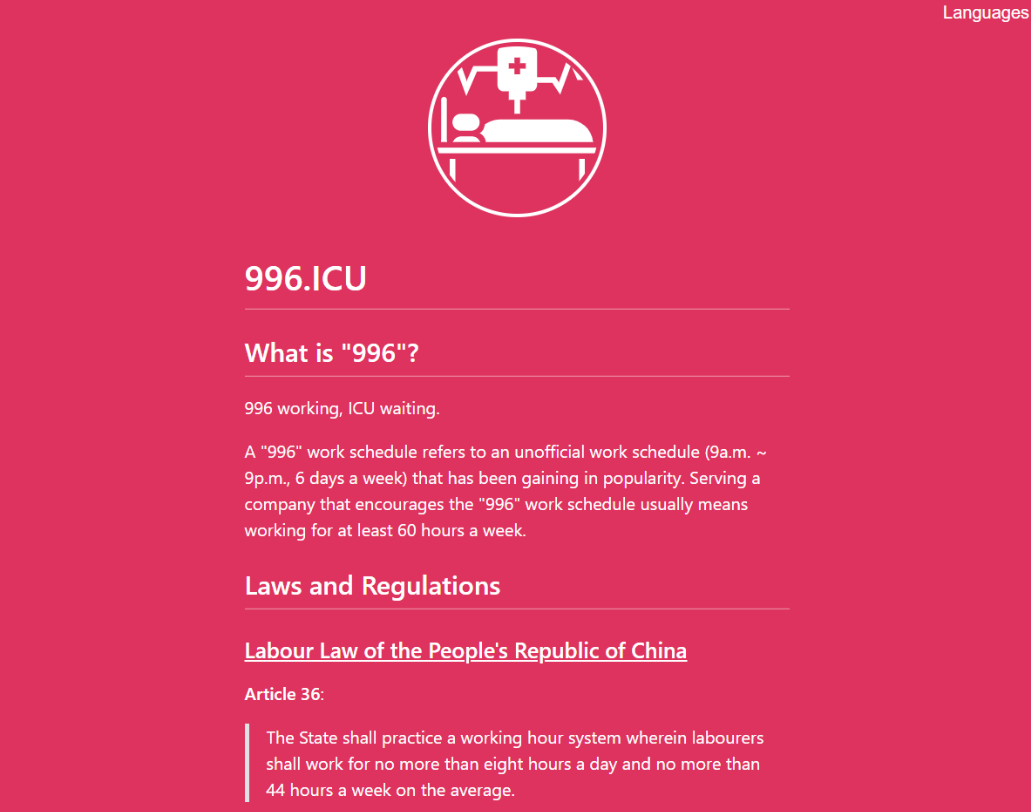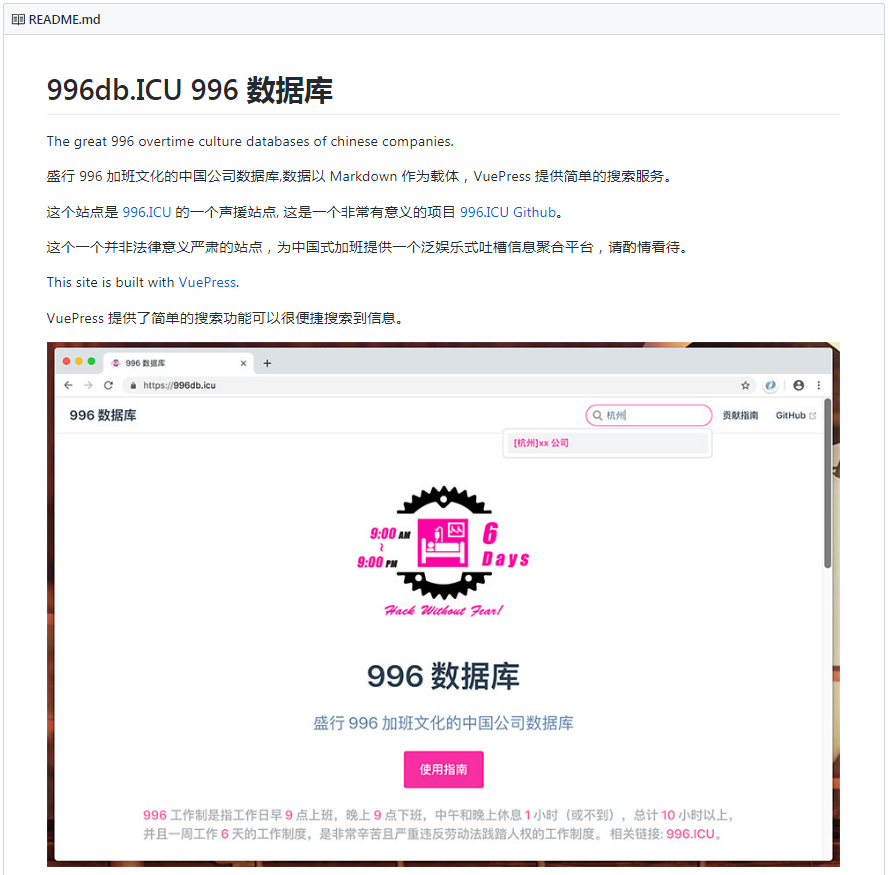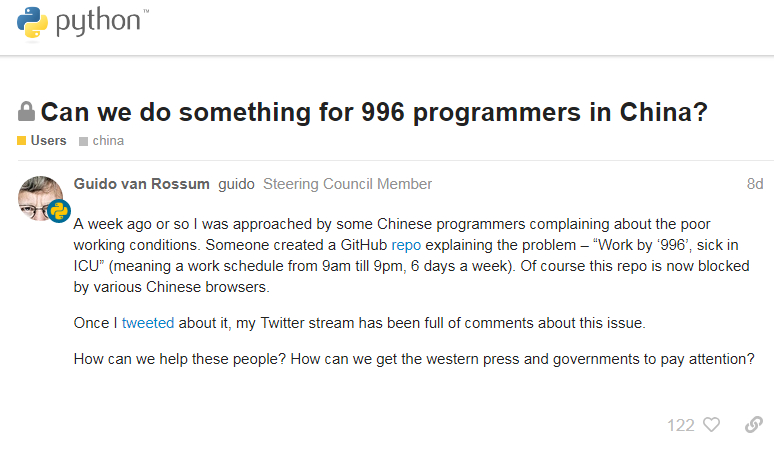
Money Stories
17:05, 14-Apr-2019
'Developers' lives matter': Chinese tech firms' overwork culture touches off debate
Yang Jing

"I don't defend 996 (working hours) but pay my respect to hard workers!" Jack Ma, founder of China's Internet behemoth Alibaba, said on his Weibo on Friday in a debate initiated by software developers about the country's demanding working hours.
"996 working, ICU waiting"
What is "996"? The term refers to an unofficial but popular work schedule at China's Internet companies (9 a.m.–9 p.m., six days a week). It usually leads to about 70 working hours a week, even though Chinese labor law stipulates that the weekly limit is no more than 48 hours, and overtime requires extra pay.
However, most 996 schedules do not come with extra pay. To get around the law, most companies take 996 as an "unspoken rule" without listing it in the contract.
There have undoubtedly been employee complaints, but the site 996.ICU brought the issue into the spotlight in late March. The domain pokes fun at the 996 schedule that dominates a programmer's life, causing one to work so much as to end up in an intensive care unit (ICU). At the bottom of the website, a slogan reads: Developers' lives matter.

Screenshot from 996.ICU
Screenshot from 996.ICU
Later, a project called 996.ICU soon followed on GitHub, a popular code and tool sharing site. Chinese programmers flocked to the project and posted a blacklist of tech companies that abide by 996 and also a whitelist for reasonable working hours. A large number of China's tech giants are on the blacklist, including Huawei and Alibaba, which are famous for high pay and pressure.

Screenshot from GitHub
Screenshot from GitHub
The project soon drew global attention. Python creator Guido van Rossum tweeted, “The 996 work schedule is inhumane.” And he also wrote in the thread, "Can we do something for 996 programmers in China?"

Screenshot from discuss.python.org
Screenshot from discuss.python.org
No pain, no gain? Internet tycoons' feedback
With the discussion of overwork moving beyond the programming community, China's tech tycoons soon joined the debate, trying to defend the culture of hard work.
Richard Liu, founder of China's e-commerce giant JD.com, said the "slackers" in his firm are not his "brothers" and he personally can work 8116, which means 8 a.m. to 11 p.m., six days a week, according to his comments posted on his personal WeChat feed on Friday.
JD will "never force" employees to work 995 or 996, but every employee must have the "spirit of fighting for work," he said in the comments.
"No company should and can force employees to work on 996 schedule…but the young people should be aware that happiness comes from hard work," Ma said in a Weibo post on Friday after the Thursday speech, eliciting about 35,000 comments by press time, most of which are critical.
These comments soon faced backlash, this time, not only from programmers.
In response to Ma's posts, Weibo's @Lec16_Wei noted that most achievements from overwork are reaped by the company owners rather than the employees.
Weibo user @YubeimingBen argued that young people should work hard, but it's their right to choose in what way.
Even Chinese media weighed in. “Creating a corporate culture of ‘encouraged overtime' will not only not help a business's core competitiveness, it might inhibit and damage a company's ability to innovate,” said an opinion piece from the People's Daily on Thursday.
Overwork is linked with poor health, both physical and mental. Compared with people who work around 35 to 40 hours a week, those who work for more than 55 hours a week face an increased risk of stroke and coronary heart disease, the Financial Times reported in January, citing a study from the Lancet medical journal.
Working long hours is also linked with depression and anxiety, which can disturb sleep and worse, the report said, quoting a national health survey from 2017 that shows about 20 percent of the adults in China who worked more than 51 hours a week reported feelings of anxiety.
China is not the only Asian country faced with long working hours. Japan, which even has a word for “death by overwork,” karoshi, is reforming the workplace this year by placing the first-ever legal cap on overtime hours. Last year, South Korea reduced its work week to 52 hours from the previous 68 hours.

SITEMAP
Copyright © 2018 CGTN. Beijing ICP prepared NO.16065310-3
Copyright © 2018 CGTN. Beijing ICP prepared NO.16065310-3